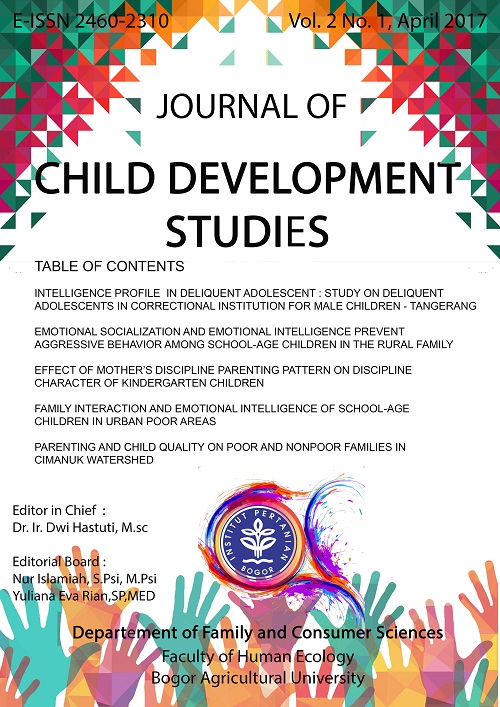Family Interaction and Emotional Intelligence of School-Age Children in Urban Poor Areas
Abstract
Emotional intelligence is the ability of children to express their emotions appropriately. Emotions play an important role in children’s lives because through the emotion someone knows what was perceived themselves and others. The aim of this research was to analyze the influence of the characteristics of children and family, interaction between children and parents as well as siblings toward school-age children’s emotional intelligence. The study design was cross-sectional study with proportional random sampling method. Samples in this study were children and mothers (n=100) in urban poor areas, which are located in Empang Village and Tegal Lega Village, Bogor City. Data were collected by interview using a questionnaire. The results showed that there is a negative significant relation between age of mother and parent-child interaction. Mother’s education length and sibling interaction have a positive significant relation with emotional intelligence. Emotional intelligence of school-age children in urban poor areas was affected by mother’s education length and sibling interaction. Age of child does not influence on child emotional intelligence in urban poor areas.
Downloads
References
Aber J. L., Bennet N. G., Conley D. C., & Jiali Li. (1997). The effects of poverty on child health and development. Annual Reviews Inc., 18, 463-483.
Alekseeva O. S., Kozlova I. E., Baskaeva O. V., & Pyankova S. D. (2014). Intelligence and sibling relationship. Procedia Social and Behavior Sciences, 146(2014), 187-191.doi: 10.1016/j.sbspro.2014.08.107
Alfiasari. (2007). Analisis ketahanan pangan rumah tangga miskin dan peranan modal sosial: Studi kasus pada rumah tangga miskin di Kecamatan Tanah Sereal dan Kecamatan Bogor Timur, Kota Bogor. [Tesis]. Bogor (ID): Institut Pertanian Bogor.
Ali M. M., & Sarullah S. (2010). Typical Siblings’ acceptance of siblings with special needs. Procedia Social and Behavioral Sciences, 9(2010), 517-521. doi:10.1016/j.sbspro.2010.12.190
Alkema N. L. (2013). Associations between sibling relationship quality and emotional competence in middle childhood .[Thesis]. California (US): California State University.
[BPS] Badan Pusat Statistik (ID). 2015. Bogor dalam angka 2015.
Brody, G. H., Flor, D., & Gibson, N. M. (1999). Linking maternal efficacy beliefs, developmental goals, parenting practices, and child competence in rural single-parent African American families. Child Development, 70, 1197–1208. Bronfenbrenner U. (1994). Ecological models of human development. International Encyclopedia of Education, 3(2),37-43.
Eamon M. K. (2001). The effects of poverty on children’s socioemotional development: an ecological system analysis. Social Work, 46(3), 256-266.
Elmanora., Muflikhati I., &Alfiasari. (2012). Gaya pengasuhan dan perkembangan sosial emosi anak usia sekolah pada keluarga petani kayu manis. Jur. Ilm. Kel. Kons, 5(2), 128-137.
Engle P. L., & Black M. M. The Effect of Poverty on Child Development and Educational Outcomes.
Evans G. W. (2004). The environment of childhood poverty.American Psychologist, 59(2), 77-92.
Furman W., & Buhrmester D. (1985). Children’s perception of the qualities of sibling relationships. J Child Dec, 56, 448-461.
Goleman D. (2004). Emotional Intelligence Kecerdasan Emosional Mengapa EI Lebih Penting daripada IQ. T Hermaya, Penerjemah. Jakarta: Gramedia Pustaka Utama. Terjemahan dari Emotional Intelligence.
Gottman J., & DeClaire J. (1997). The Heart of Parenting. British: Bloomsbury Publishing.
Hastuti D., Syarief H., Megawangi R., Guhardja S., & Patmonodewo S. (2008). Karakteristik keluarga, interaksi ibu-anak dan pengasuhan serta pengaruhnya pada tumbuh kembang anak di Bogor dan Depok. Media Gizi & Keluarga, 32(1), 42-55.
Hastuti R. (2011). Analisis nilai anak, kualitas pengasuhan, dan perkembangan anak usia sekolah pada keluarga petani karet dan petani sawit di Kabupaten Bungo (Skripsi), Institut Pertanian Bogor, Bogor.
Hoeve M., Dubas J. S., Eichelsheim V. I., Van der Laan P. T., Smeek W., & Gerris J. R. M. (2009). The relationship between parenting and delinquency: a meta-analysis. J Abnorm Child Psychol 37, 749-775. doi:10.1007/s10802-009-9310-8
Holilah S. (2013). Gaya pengasuhan ibu dan interaksi saudara kandung pada remaja berdasarkan status pekerjaan ibu (Skripsi), Institut Pertanian Bogor, Bogor.
Howe N., & Recchia H. (2014). Sibling relations and their impact on children’s development. Encyclopedia on Early Childhood Development.
Irzalinda V., Puspitawati H., & Muflikhati I. (2014). Aktivitas bersama orang tua-anak dan perlindungan anak meningkatkan kesejahteraan subjektif anak. Jur.Ilm. Kel. & Kons, 7(1), 40-47.
King D. L. (2007). How non-disabled children respond to a sibling with disability? : the challenges they may or may not haved faced [Thesis]. Northampton, Massachusetts: Smith College School for Social Work.
Kose F., & Demiriz S. (2009). An affair analysis of mother’s attitudes and 9 years old offspring’ sibling relations. Procedia - Social and Behavioral Sciences, 1(2009), 872-876.doi:10.1016/j.sbspro.2009.01.15
Mafriana S. B. (2003). Fungsi ekspresif-instrumental orang tua dan kecerdasan emosional anak: studi komparatif lintas budaya antara Etnik Banjar dan Etnik Madura. [Tesis]. Bogor (ID): Institut Pertanian Bogor.
Nandwana S., & Joshi K. (2010). Assessment of emotional intelligence of tribal adolescents of Udaipur: an explonatory study. Stud Tribes Tribals, 8(1), 37-40.
Punia, S., & Sangwan, S. (2011). Emotional Intelligence and Social Adaptation of School Children. Journal Psychology, 2(2): 83-87 (2011)
Rachmawati M. (2015). Pengaruh sosialisasi emosi dan kecerdasan emosi terhadap perilaku agresi anak usia sekolah pada keluarga perdesaan (Skripsi), Institut Pertanian Bogor, Bogor.
Setyowati Y. (2005). Pola komunikasi keluarga dan perkembangan emosi anak (studi kasus penerapan pola komunikasi keluarga dan pengaruhnya terhadap perkembangan emosi anak pada keluarga Jawa). Jurnal Ilmu Komunikasi, 2(1), 67-78.

